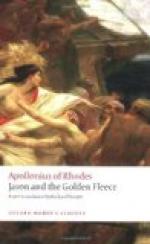After them came Phlias from Araethyrea, where he dwelt in affluence by the favour of his father Dionysus, in his home by the springs of Asopus.
From Argos came Talaus and Areius, sons of Bias, and mighty Leodocus, all of whom Pero daughter of Neleus bare; on her account the Aeolid Melampus endured sore affliction in the steading of Iphiclus.
Nor do we learn that Heracles of the mighty heart disregarded the eager summons of Aeson’s son. But when he heard a report of the heroes’ gathering and had readied Lyrceian Argos from Arcadia by the road along which he carried the boar alive that fed in the thickets of Lampeia, near the vast Erymanthian swamp, the boar bound with chains he put down from his huge shoulders at the entrance to the market-place of Mycenae; and himself of his own will set out against the purpose of Eurystheus; and with him went Hylas, a brave comrade, in the flower of youth, to bear his arrows and to guard his bow.
Next to him came a scion of the race of divine Danaus, Nauplius. He was the son of Clytonaeus son of Naubolus; Naubolus was son of Lernus; Lernus we know was the son of Proetus son of Nauplius; and once Amymone daughter of Danaus, wedded to Poseidon, bare Nauplius, who surpassed all men in naval skill.
Idmon came last of all them that dwelt at Argos, though he had learnt his own fate by augury, he came, that the people might not grudge him fair renown. He was not in truth the son of Abas, but Leto’s son himself begat him to be numbered among the illustrious Aeolids; and himself taught him the art of prophecy—to pay heed to birds and to observe the signs of the burning sacrifice.
Moreover Aetolian Leda sent from Sparta strong Polydeuces and Castor, skilled to guide swift-footed steeds; these her dearly-loved sons she bare at one birth in the house of Tyndareus; nor did she forbid their departure; for she had thoughts worthy of the bride of Zeus.
The sons of Aphareus, Lynceus and proud Idas, came from Arene, both exulting in their great strength; and Lynceus too excelled in keenest sight, if the report is true that that hero could easily direct his sight even beneath the earth.
And with them Neleian Periclymenus set out to come, eldest of all the sons of godlike Neleus who were born at Pylos; Poseidon had given him boundless strength and granted him that whatever shape he should crave during the fight, that he should take in the stress of battle.
Moreover from Arcadia came Amphidamas and Cepheus, who inhabited Tegea and the allotment of Apheidas, two sons of Aleus; and Ancaeus followed them as the third, whom his father Lycurgus sent, the brother older than both. But he was left in the city to care for Aleus now growing old, while he gave his son to join his brothers. Ancaeus went clad in the skin of a Maenalian bear, and wielding in his right hand a huge two-edged battleaxe. For his armour his grandsire had hidden in the house’s innermost recess, to see if he might by some means still stay his departure.




